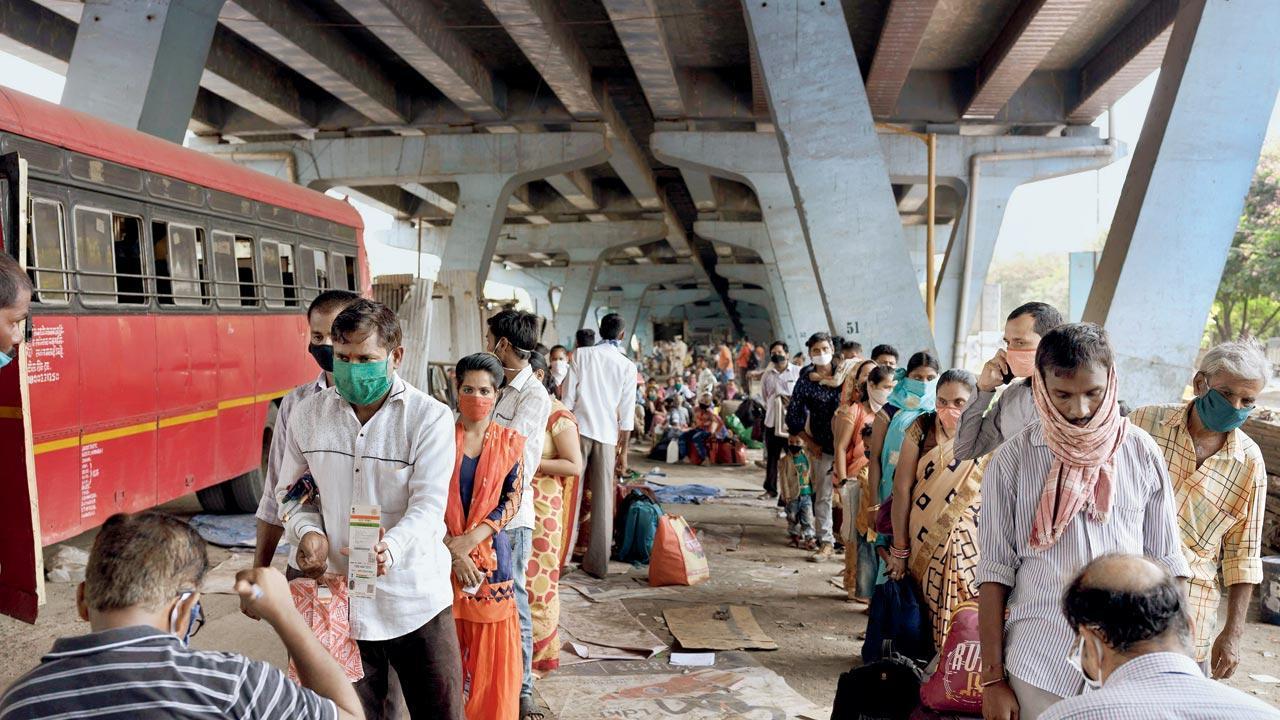Award-winning filmmaker duo that catalogued the exodus of migrant workers early into the lockdown, on why this grim past should never be forgotten

Labourers trying to get safe passage out of Mumbai during the COVID-induced lockdown. Pic Courtesy/Amit Madheshiya
Back in 2020, when the world went into complete lockdown, filmmakers Amit Madheshiya and Shirley Abraham found themselves at the Lokmanya Tilak Terminus in Kurla. Part curiosity, part in search for their next subject, the duo arrived there, little expecting what they were going to witness. “There were thousands and thousands of people waiting to climb onto a train,” says Madheshiya 41, over a video call from his hometown Mau in Uttar Pradesh. Nothing moved. Neither the people, nor the trains.
ADVERTISEMENT
That moment left a deep imprint on their mind, strengthening their resolve to capture the fear, angst and helplessness they had seen in the eyes of these migrant labourers.
Their film, The Great Abandonment, which released late last year, won the best documentary (English) this week, at the Human Rights Press Awards organised by Human Rights Watch and the Walter Cronkite School of Journalism and Mass Communication, in the Arizona State University, US.
 Shirley Abraham and Amit Madheshiya
Shirley Abraham and Amit Madheshiya
Abraham and Madheshiya were busy filming another project in the city, when the lockdown was announced on March 24. But the pandemic led them in another direction. Documenting the migrant labourers’ plight was more urgent, they felt. The duo got infected with COIVID-19 on multiple occasions during the filming. “It was foolishness [on our part],” admits Madheshiya, “But we wanted to be there and document this. There had to be proof that this happened.”
Imran, a migrant labourer, is the strongest voice in the documentary. “I request my brothers, do not come back to this city. Stay back in your villages for six months to a year... this city’s economy will crumble to the ground and they will be forced to come our villages,” he says in the film, dejected and despondent. But he did return, says Abraham, 40. “Imran ended up butchering chickens in his village in Bihar. This was not the work he wanted or was doing in Mumbai. He worked as an artisan in a cloth manufacturing unit. In an alternate reality, he imagines himself to be an actor—he is training to be one too, and for him the charm of Mumbai is something that would constantly lure him back.”
There are poignant moments in the film, like the stories of the children of the migrants—a girl takes cover under a cloth during a storm, while an adolescent boy makes a cape out of his sheet and strikes a superman pose as the storm worsens and scatters his family’s belongings on to the street. Madheshiya recalls another scene that didn’t make the cut, where the same boy was playing “house-house” with his sisters and watered the saplings outside their make-believe garden from a packed water bottle. “The father snapped at him and told him not to waste water... it was such a precious commodity for the family,” he says.
During filming the duo says the lack of policy was apparent, but the lack of apathy towards the migrant labourers’ plight made it worse. “People would ask them, ‘Why are you walking?’ They couldn’t relate to their trauma, and the fact that all doors to go back to their villages, had been effectively closed,” says Abraham.
At an important juncture in the film, Prime Minister Narendra Modi’s address via his monthly radio programme, Mann Ki Baat—it celebrated 100 episodes last week—plays in the background. “The nation has witnessed our poor brothers and sisters’ struggles... Especially, our labourers, who have suffered a lot during this time. They have performed devoted sacrifices. That India must conquer the 21st century is not just our dream, but our collective responsibility. Only one path can guide us: that of self-reliant (Atmanirbhar) India. It will be nourished by our nation’s labourers and the scent of their sweat,” Modi says, while labourers being unloaded from trucks and beaten up by policemen plays on the screen.
 Subscribe today by clicking the link and stay updated with the latest news!" Click here!
Subscribe today by clicking the link and stay updated with the latest news!" Click here!







